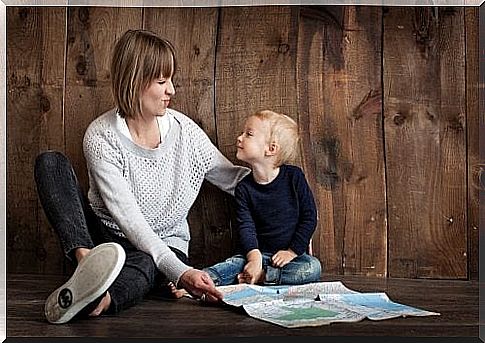Children’s Most Common Questions

Children’s curiosity is unlimited. They question everything they don’t understand or that catches their attention. That’s why adults must be prepared to confidently answer children’s most common questions.
This usually happens after the age of three, when the left hemisphere of the brain begins to mature. As a child grows up, he begins to look for the logic of things and look at the world in a different way.
Facing this period of questioning can be a bit tiring for parents. However, it ‘s a good sign that the child’s brain development is happening right and that their analytical skills are improving every day.
It can be exhausting to answer so many questions in a row. Therefore, it is essential that we arm ourselves with a lot of patience. Children are curious to learn, and the adults around them will always be their first choice to resolve all these doubts.
Benefits of Children’s Curiosity
These are the main advantages of this phase of so many questions for children:
- Stimulates the brain.
- Helps to overcome anxiety.
- Favors interpersonal relationships.
- Increases the ability to learn new things.
- Increases interest in reading.
- Improves communication skills.
The little ones in the house can ask countless questions, on different topics and with different levels of complexity. Questioning why everything becomes daily in their lives, especially when they are situations that arise in their daily lives, such as atmospheric phenomena or the reason why they need to do their homework.

Learning something new every day from family members is always fun. Children see the adults around them as guides and holders of all universal knowledge.
But if the parents’ attitude is one of tiredness and annoyance at their children’s curiosity, they may lose confidence and the desire to learn. These are some of the most common questions children ask:
- Why does it rain?
- Why is the neighbor dark-skinned?
- How are babies born?
- Where does the snow come from?
- Because the sky is blue?
- How much salt is there in the sea?
- Why should children do their duties?
- What is death?
- How do birds fly?
- Why should I go to school?
- Why should I eat vegetables?
- How are babies made?
This is a cycle in which the child really tends to question things. So, if you find that she is intrigued by something, you always need to try to answer it in a simple way that matches her age.
How to Answer Children’s Most Common Questions
answer with another question
Children need to be helped to think. Therefore, returning the question can motivate them to find an answer themselves. For example, you can say, “What do you think?” or “Why do you think this happens?” This strategy can be a good option.
Handle adult affairs cautiously
When the questions are related to adult issues, we must provide concrete answers for the child, using language according to compression abilities and age.
Do not respond in a hurry or just to get rid
Along with the famous question “But why?”, there is another series of questions that require time and patience to be clarified.
Answering unwillingly or incorrectly, just to get rid of the question, is an attitude that should be avoided. Remember that curiosity will help children develop intelligence, improve language, and build confidence.
Children’s most common questions can be difficult
Of course, there are a number of questions that we need to pay special attention to these days, which are those that refer to abuse. Four decades ago, a small child wouldn’t ask who or what a pedophile, a rapist, or a corrupt person is, but today it can.
In fact, this type of question can occur for two reasons: first, because the child heard the word on television or, second, because it was said by a friend; secondly, it could be because she read about it on internet sites.

This type of question, like so many others, originates from the child’s simple curiosity, who demands that his or her most reliable source of information clarify it. Therefore, in these cases, it is always better to explain at home what they mean.
Furthermore, events such as terrorist attacks, wars, natural disasters and other unfortunate situations will certainly raise questions for the child. Adults can do a lot in these cases, as they would not only answer a simple question, but would also take advantage of the situation to promote values in that regard.
It takes a lot of patience and intelligence to find the right terms to give children an explanation about the complex things in life and what happens on this planet we live on.
But, with love and dedication, we will be able to promote our children’s curiosity so that the desire to continue learning is infinite.







